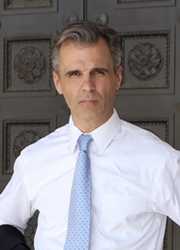
NJ and Philadelphia nursing home abuse attorney, Brian Murphy
“Adequate nutrition, hydration, and hygiene measures amount to fundamental care of vulnerable residents,” says Murphy. “Seeing a loved one in a nursing home after so long could reveal significant changes, including potential abuse and neglect.”
PHILADELPHIA (PRWEB)
March 24, 2021
Revised visitation guidance comes as over three million doses of the COVID-19 vaccine have been given in nursing homes. Visitation is permitted whether or not guests or residents have received vaccinations. This lifting of restrictions set in place after the coronavirus began ravaging American nursing homes last spring will give many family members the first access to loved ones they’ve had in a year’s time. This renewed access will provide visitors with a glimpse into the quality of care residents have been receiving during the pandemic, which has the potential to lead to a significant increase in claims against nursing homes.
Visiting family members, attuned to the appearance of signs in their loved ones of neglect or abuse, are most often the ones to sound the alarm, seeking state investigations and/or initiating legal actions. The return of these advocates to nursing homes, where staffing shortages and an accompanying poor quality of care have been underscored by months of impact from the coronavirus pandemic, could result in a substantial rise in claims.
Most common among claims of neglect and abuse in nursing homes is bedsores (also known as pressure ulcers, pressure injuries and decubitus ulcers). Bedsores—skin ulcers that result when immobile residents are left in the same position for prolonged periods of time—are among the most likely evidence of neglect family members might discover after resuming visits. Homes struggling to cope with staffing shortages during the pandemic might have neglected to move bed-ridden or wheelchair-bound patients often enough—or to provide necessary hygiene, nutrition, and hydration—to prevent the formation of bedsores. They also might have neglected to attend to any pressure ulcers that their patients have already developed. Untreated bedsores can quickly deteriorate into serious wounds and lead to infections that, if ignored, can penetrate to the bone and result in osteomyelitis, sepsis, and even death. With pressure ulcers being almost always preventable with the right intervention, discovering new or deteriorated bedsores on their loved ones is a compelling indication to visiting family members that nursing home neglect has occurred during in the time they were prevented from visiting.
Beyond pressure ulcers, visiting family members may discover that residents have suffered falls, fractures, malnutrition, dehydration, or infection, any of which is indicative of neglect and abuse and could also contribute to an increase in claims against nursing homes. After discovering any evidence of nursing home neglect or abuse, family members looking to inquire about their loved one’s rights or hoping to learn what measures should be taken to hold nursing homes accountable should seek the advice of an experienced attorney with a strong background litigating bedsore and nursing home abuse cases.
About The Law Offices of Brian P. Murphy
Licensed in Pennsylvania and New Jersey, Brian P. Murphy established The Law Offices of Brian P. Murphy in 2015 to help victims of nursing home abuse and neglect in Philadelphia/Pennsylvania and New Jersey. Committed to holding PA and NJ nursing homes responsible for nursing home neglect, abuse and fraud, Murphy has extensive experience with cases involving bed sores, falls, and wrongful deaths. He has written a number of law articles and legal guides about nursing home abuse and has given several lectures on the effective litigation of neglect and abuse cases. For more information please contact Brian P. Murphy directly at (215) 579-8500, or visit the company’s website: https://www.thenursinghomeattorneys.com.
Share article on social media or email:

